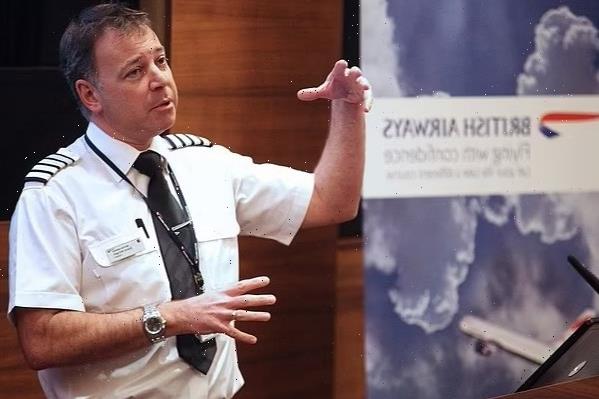
I'm a BA captain and I have the key to cure your fear of flying – it’s all about knowing the facts | The Sun
02/26/2023A BRITISH Airways pilot has revealed some facts about flying that could help nervous passengers.
Steve Allright runs BA's Flying with Confidence course and covers everything from turbulence to squeaky noises.
Captain Allright has been a captain on the 757/767, 747 and is now flying the 787.
He told MailOnline Travel: "Our most important statement of the British Airways Flying with Confidence course is – "turbulence is uncomfortable but never dangerous.
"All modern commercial aircraft are incredibly robust and can withstand any amount of turbulence.
"From the early years of aviation, designers knew what was required and many safety factors are higher than in any other form of transport.
Read more on Travel
Ryanair flight attendant reveals hilarious truth about Tiktok hand luggage hacks
The small mistakes that could cause you big problems when boarding planes
"In addition, and crucially, new aircraft are tested to extreme limits before they are certified to carry passengers.
"On our Flying with Confidence course, we show a Boeing 787 in a test rig straining the wings to way beyond what they would ever experience in even the most severe turbulence.
Most read in The Sun
Mayweather vs Chalmers delayed at virtually EMPTY O2 after ticket struggle
Mayweather beats Geordie Shore's Aaron Chalmers in 'sham' fight at empty O2
Paddy McGuinness 'gets cosy with Kirsty Gallacher' after marriage split
Inside UK's 'BEST' seaside town with picturesque beach & quirky shops
"Along with the above statement, our customers find this most reassuring.
How far can a plane drop in turbulance?
Captain Allright says: "Certainly not the thousands of feet that you hear people talking about or see in some films.
"Usually in turbulence only around 10 to 20ft, though this can be more in severe turbulence.
"It is important to stress that your pilots are trained to deal with turbulence and that severe turbulence is extremely rare.
"I've been flying for 32 years and have only ever experienced severe turbulence once."
What is the primary purpose of putting on seatbelts during turbulence?
Captain Allright says: "We do not want people injuring themselves by falling over in turbulence.
"We always stress that customers should follow the advice and instructions by the crew at all times."
Are there parts of the plane where the effects of turbulence are less severe?
Captain Allright says: "Barely, it is possible that you may have slightly less movement near the centre of some aircraft, but it is negligible.
"What's important to remember is that turbulence may be uncomfortable but not dangerous."
What is that loud squeaking noise you hear after the plane has backed out of the gate?
Captain Allright says: "This is known as the Airbus "barking dog" noise.
"We give a full explanation on the course and talk customers through each and every noise on the flight, which gives added reassurance, but basically it's the sound of the aircraft's hydraulic power system working.
"More importantly, it's perfectly normal, like so many noises that anxious flyers may worry about on aircraft.
"We encourage people on our courses to assume that everything is normal unless they are told otherwise."
Some people fear that a plane is just 'too heavy to take off'… any calming words for this?
Captain Allright says: "Pilots carefully calculate the speed at which it is safe to take off using highly sophisticated technology to ensure the aircraft weight is correct.
"This is checked and double-checked, which is true of every aspect of our safety procedures and checklists."
Some get frightened after take-off as it sounds like the engines are cutting out once a certain altitude is reached…
Captain Allright says: "We spend quite a long time explaining this on the course as it's quite complicated.
"Basically, the balance system in your inner ears is playing tricks on you when we reduce the power after take-off because we no longer need so much power as the drag is reduced after the landing gear is raised.
"All perfectly normal."
Any danger of the plane running out of fuel?
Captain Allright says: "We always reassure people on the Flying with Confidence course that the aviation industry always factors in the very highest safety margins.
"Aircraft always carry enough to land with – still at least a further 30 minutes flying time – even after a go-around and a diversion.
"This is regulated by law and huge amounts of planning goes into each and every flight, for example electing diversion airports in the event that they are required.
"Everything is meticulously planned in advance."
What if the engines fail?
Captain Allright says: "The wings enable aircraft to fly, not the engines.
"A commercial aircraft flying at 30,000ft can glide for 100 miles even if all the engines fail."
Can a plane land with all the wheels broken?
Captain Allright says: "Yes, while such a scenario is highly unlikely, safety is always our absolute focus – so pilots practice at length for a wide range of potential emergency scenarios.
'It is worth remembering that pilots are the most highly trained and regulated professionals in the world, and are rigorously tested on the flight simulators every six months.
"We invest heavily in training – at British Airways we have a world-class training facility, with 14 full-motion flight simulators.
"Commercial aircraft are also incredibly well maintained, and are checked before every flight by pilots and engineers.
"Routine maintenance is conducted at regular, specified intervals by licensed engineers."
Should passengers be worried when the cabin lights flicker?
Captain Allright says: "No, not at all as this is perfectly fine. This would likely just be a momentary power transfer from different electrical sources."
Any additional advice for people if they do still feel nervous?
Captain Allright says: "We would encourage anyone who feels nervous about flying to join us on the British Airways Flying with Confidence course.
"We have decades of experience helping nervous flyers, during which time we've helped more than 50,000 people overcome their fear.
Read More on The Sun
BBC fans rejoice as beloved drama lands TWO more series and Christmas specials
Martin Lewis fan reveals how they boosted pension by £11,500 with easy hack
"It's also important to remember that all of our crews are trained to help nervous travellers so they can help customers who may be feeling anxious on board.
"There is also a reassuring Flying with Confidence video on our in-flight entertainment system on every British Airways long-haul flight."
Source: Read Full Article











